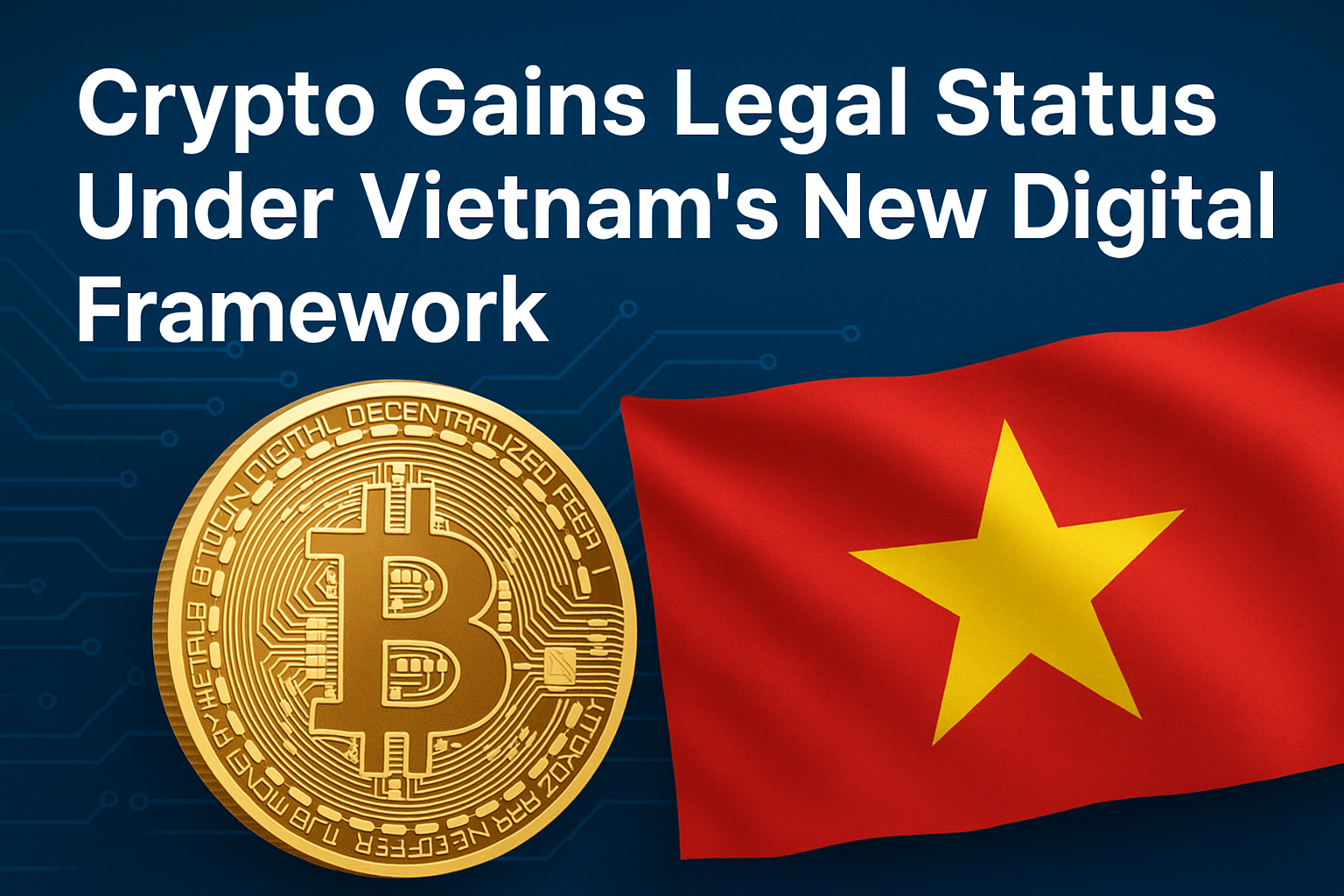
Vietnam Recognizes Crypto as Legal
Vietnam has taken a major step toward embracing the digital economy by passing the Law on Digital Technology Industry, its first legal framework explicitly addressing crypto assets. Approved by the National Assembly on June 14, 2025, this forward-looking legislation is set to come into effect on January 1, 2026, giving businesses and regulators time to adapt.
The law not only recognizes the legitimacy of crypto assets but also makes key distinctions between different kinds of digital assets. This classification aims to reduce the ambiguity that has plagued Vietnam’s crypto sector for years.
Vietnam’s recognition of crypto comes at a pivotal moment, as the country seeks to modernize its financial system, encourage digital innovation, and improve its standing on the Financial Action Task Force (FATF) compliance list. The FATF placed Vietnam on its gray list in 2023, citing deficiencies in anti-money laundering (AML) efforts and cross-border financial transparency. This new law addresses many of those concerns directly.
New Law Defines Digital Assets
The Law on Digital Technology Industry establishes a two-tier classification system that differentiates virtual assets from crypto assets:
- Virtual assets are digital representations used for exchange or investment. These may or may not use encryption.
- Crypto assets specifically involve encryption or similar digital technologies for creation, issuance, storage, and transfer.
Importantly, the law excludes securities and fiat currencies from the crypto asset definition, offering clear boundaries between traditional and emerging asset classes.
This clarity allows both local businesses and international investors to better understand what is permissible and how operations must be structured. Previously, Vietnam’s ambiguous regulatory stance deterred long-term crypto projects and led to legal uncertainties for businesses and consumers alike.
The law’s structure also mirrors global AML frameworks, bringing Vietnam more in line with countries like Japan, South Korea, and members of the European Union.

FATF Compliance and Regulation
Vietnam’s position on the FATF gray list has placed financial institutions under increased scrutiny. Cross-border transactions involving Vietnamese entities face delays and additional checks. To address this, the new law explicitly mandates cybersecurity protocols and compliance with international AML standards.
Under the new law:
- Regulatory agencies must implement robust mechanisms to detect and prevent money laundering, terrorism financing, and illicit financing of weapons.
- The government retains the authority to issue detailed sub-classifications of digital assets and enforce operational protocols.
- All digital asset platforms must align with global compliance norms, which are part of the FATF’s recommendations for removing countries from the gray list.
These changes are expected to gradually improve Vietnam’s international standing. If executed properly, they could lead to Vietnam’s removal from the FATF gray list, opening up broader opportunities for foreign investment and cross-border partnerships.
Tech Innovation Beyond Cryptocurrency
While crypto regulation is one of the key highlights, the Law on Digital Technology Industry is broader in scope. It supports a comprehensive digital technology development strategy, with a strong emphasis on national innovation, industrial upgrading, and digital transformation.
Key non-crypto initiatives include:
- Tax breaks and land-use incentives for high-priority tech sectors like AI, semiconductor design, and software production.
- Establishment of national AI data centers and shared digital infrastructure to power future applications.
- Subsidies to support hiring and workforce development, especially in semiconductor and digital systems engineering.
- Promotion of technology experimentation, allowing companies to test new systems under controlled legal conditions.
Local governments are also mandated to build human resource development programs in partnership with the private sector, universities, and international organizations.
This part of the legislation positions Vietnam as a rising hub for digital innovation in Southeast Asia. By formally recognizing software, AI systems, and semiconductor projects as strategic national priorities, Vietnam aims to draw both local and foreign capital to its innovation economy.
Vietnam’s Digital Future Looks Bright
The law’s official rollout in 2026 signals a transformative shift in how Vietnam approaches the digital economy. It demonstrates a careful balancing act: fostering innovation, protecting users, and aligning with global standards.
Key takeaways:
- Vietnam is legitimizing crypto assets by defining and regulating them under national law.
- A two-tier classification system clarifies the distinction between virtual and crypto assets.
- The legislation boosts Vietnam’s efforts to exit the FATF gray list through AML compliance and regulatory transparency.
- Non-crypto industries such as AI, semiconductors, and digital services receive formal support through tax, hiring, and infrastructure incentives.
- The law reflects a strong commitment to digital transformation and international tech cooperation.
As implementation begins, the real test will lie in the law’s enforcement mechanisms, regulatory clarity, and private sector adoption. If successful, Vietnam could become a model for other developing economies seeking to regulate crypto without stifling innovation.
The passage of this law is more than just a nod to digital finance—it’s a signal to the global tech community that Vietnam is ready to compete, innovate, and lead.